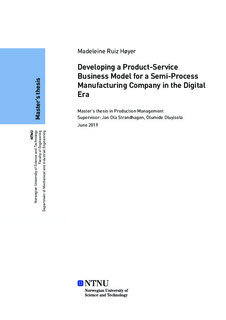| dc.contributor.advisor | Strandhagen, Jan Ola | |
| dc.contributor.advisor | Oluyisola, Olumide | |
| dc.contributor.author | Høyer, Madeleine Ruiz | |
| dc.date.accessioned | 2019-10-19T14:00:16Z | |
| dc.date.available | 2019-10-19T14:00:16Z | |
| dc.date.issued | 2019 | |
| dc.identifier.uri | http://hdl.handle.net/11250/2623306 | |
| dc.description.abstract | Hensikt. Økende digitalisering, konkurranse og kommoditisering tvinger produsenter til å vurdere nye måter å tilby produktene sine på slik at de kan forbli konkurransedyktige og bærekraftige. Smart «product-service systems» (PSS) kombinerer tjenester og konvensjonelle produkter som har blitt forbedret med sensorer. Denne masteroppgaven forslår ulike produkttjenestetilbud som en rørprodusent kan tilby kunder slik at de forblir konkurransedyktige, til tross for de endrede markedsforholdene og kundenes forventninger.
Design / metode / tilnærming. En systematisk litteraturstudie er gjennomført for å utforske den eksisterende litteraturen om PSS og semi-strukturerte intervjuer har komplementert funnene. Ulike PSS-løsninger tilpasset vannrør er foreslått basert på denne litteraturstudien, intervjuene og egne refleksjoner.
Funn. Litteraturstudiet støtter den økende populariseringen av fenomenet som kombinerer produkter med tjenester. Litteraturen bekrefter at PSS vil skille en produsent fra sine konkurrenter, og vil gi dem muligheten til å møte både kundens krav mer nøyaktig og i tillegg gi større verdi. Likevel må utfordringer vurderes. En PSS-skala er laget og skreddersydd for vanndistribusjonsindustrien. Med innspill fra intervjuer har de mest attraktive løsningene blitt foreslått, og utfordringene og konsekvensene for en spesifikk løsning har blitt diskutert.
Forskningsbegrensninger / implikasjoner. Siden PSS-skalaen er opprettet basert på input fra bare en produsent og en kunde, bør fremtidig forskning utvides til flere lignende tilfeller. Masteroppgaven er begrenset av de to tilgjengelige databasene, søkekriteriene, søkemetoden, inkluderings- og ekskluderingskriteriene og tidsbegrensningen.
Praktiske implikasjoner. Konvensjonelle produsenter må identifisere nye måter å levere verdi til sine kunder, og dette kan oppnås ved å komplementere produkter med tjenester.
Originalitet / verdi. Oppgaven undersøker litteraturen om utviklingen av PSS i produksjonen, og foreslår en ny PSS-skala skapt i samarbeid med bedriftene. Det tyder på at dette er den første oppgaven som omhandler forsyningsprodukter som plastrør. | |
| dc.description.abstract | Purpose. Increasing digitalisation, competition and commoditisation are forcing manufacturers to consider new ways of offering their products such that they can remain competitive and sustainable. Smart product-service systems (PSS) bundle services and manufactured products enhanced with sensors. This thesis suggests different product-service offerings which a pipe manufacturer can offer such that they remain attractive to their customers, regardless of the changing market conditions and customer expectations.
Design/methodology/approach. A systematic literature review has been conducted to explore the existing literature on PSS and semi-structured interviews have complemented the findings. Various PSS solutions tailored towards water pipes are proposed based on the gained insights.
Findings. The literature review supports the increasing popularisation in bundling manufactured products with services. Existing literature confirms that PSS will differentiate a manufacturer from their competitors and allow them to both meet customer requirements more accurately and deliver greater value. Nonetheless, challenges must be considered simultaneously. A PSS scale has been created and tailored towards the water distribution industry. With the input from interviews, the most attractive solution bundle satisfying the current situation has been suggested, and the challenges and the impacts it will have on the current operations have been discussed.
Research limitations/implications. Since the PSS scale has been created based on the input from only a manufacturer and a customer, future research should be extended to several similar cases. The thesis is limited by the two databases accessed, the search criteria, the search method, the inclusion and exclusion criteria, and the time constraint.
Practical implications. Conventional manufacturers must identify new ways of delivering value to their customers and this can be achieved by complementing their products with services.
Originality/value. The thesis explores the literature on the evolution of PSS in manufacturing and suggests a new PSS scale created in collaboration with the case companies. This appears to be the first paper to address utility products like plastic water pipes. | |
| dc.language | eng | |
| dc.publisher | NTNU | |
| dc.title | Developing a Product-Service Business Model for a Semi-Process Manufacturing Company in the Digital Era | |
| dc.type | Master thesis | |
